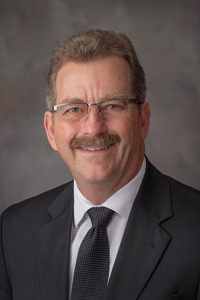Updated broadband standards, 911 requirements advanced
A bill to harmonize broadband internet standards advanced to the second round of debate March 18 after lawmakers amended it to include provisions of several other bills related to telecommunications.

Under LB1031, as introduced by Brainard Sen. Bruce Bostelman, the Nebraska Public Service Commission could not provide ongoing high-cost support from the Nebraska Telecommunications Universal Service Fund for infrastructure not capable of internet access at certain minimum speeds.
Bostelman said the bill is intended to end state support for obsolete copper-based telecommunications networks that cannot provide internet at speeds necessary to meet modern needs.
Under a Transportation and Telecommunications Committee amendment, adopted 36-0, the commission could not provide ongoing high-cost support for any broadband serviceable location not capable of internet access at speeds of at least 100 megabits per second for downloading and 20 Mbps for uploading unless the location is subject to a federally enforceable commitment for deployment of infrastructure capable of those speeds.
The requirement would take effect 18 months after the bill’s operative date. Beginning in 2029, the commission would not provide ongoing support for those locations regardless of any federally enforceable commitment.
The amendment also would update several areas of state law to define broadband service as capable of providing internet access at speeds of at least 100 Mbps for downloading and 20 Mbps for uploading.
The provisions of five other bills heard by the committee this session also are included in the amendment.
The provisions of LB865, also sponsored by Bostelman, would require broadband internet service providers operating in Nebraska to submit an annual report to the Nebraska Broadband Office with information on each standard internet service plan advertised by the provider and the associated rates.
Under the provisions of LB1038, introduced by Sen. Barry DeKay of Niobrara, one of the five members representing the general public on the Nebraska Information Technology Commission would have agriculture as their principal business or occupation.
The provisions of LB1180, sponsored by Lincoln Sen. Anna Wishart, would revise standards and criteria that determine eligibility of deaf, hard of hearing and speech-impaired Nebraskans who apply to the PSC for specialized telecommunications equipment.
Currently, one person per household may receive equipment. Under the amendment, two residents at the same address could receive it, and a recipient could reapply for assistance every three years instead of every five.
The amended provisions of LB1255, introduced by Sen. John Fredrickson of Omaha, would require originating service providers, providers of telecommunications relay services and the state’s next-generation 911 service contractor to ensure that 911 calls are transmitted to next-generation 911 or other points designated by the state 911 director no later than Jan. 1, 2026.
Providers could enter into an agreement with the director to establish an alternative deadline for meeting another proposed requirement that all translation and routing is completed to deliver all 911 calls to the next-generation 911 system.
The amendment also would require the next-generation 911 service contractor to submit an annual report to the Transportation and Telecommunications Committee and to the state 911 director on the capabilities and redundancies of the next-generation 911 service network.
Fredrickson introduced an amendment, adopted 38-0, that would require providers and the contractor to enter into an agreement to meet the transmission, translation and routing requirements no later than 10 months before the 2026 deadline. If no agreement is reached by then, they would be required to notify the PSC to seek resolution.
Under the amended provisions of LB1256, sponsored by Bennington Sen. Wendy DeBoer, a communications service provider required to file reports regarding 911 service system outages with the Federal Communications Commission also would have to file copies of those reports with the PSC.
The amendment would require the PSC to hold a public hearing within 90 days of receiving a report. The requirement would not apply if a provider withdraws the report filed with the FCC or if the PSC waives it by a majority vote.
After adopting two additional technical amendments, lawmakers voted 38-0 to advance LB1031 to select file.

